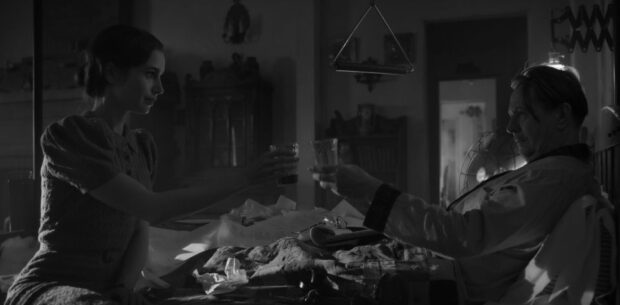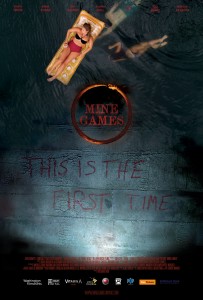Whether Citizen Kane is still the greatest film ever made is a matter of regular debate, one I’ve engaged in from time to time. Yet almost eight decades after its release, it is unquestionably one of the most influential movies in the canon.
Even more fascinating is the story behind the printed legend. The debut work of talented wunderkind Orson Welles and his war with newspaper magnate William Randolf Hearst has been covered in the documentary The Battle for Citizen Kane, and later fictionalised in RKO 281 (1999). Both acknowledge the importance of screenwriter Herman J. Mankiewicz, best known at the time as the fixer of other people’s screenplays.
Now co-credited as the writer of Citizen Kane, Mankiewicz’s life and process serves as the focal point of David Fincher’s MANK, his first feature in six years. Based on the screenplay of his father Jack Fincher (who died in 2003), the film casts Gary Oldman as the titular Mank.

The writer is introduced as a literally broken man: an alcoholic exiled by Welles (Tom Burke) to a remote house, and his leg in plaster from a hitherto undisclosed accident. Tended to by secretary Rita (Lily Collins) and a German nurse, the writing process unfolds through flashbacks to his tumultuous relationship with Hearst (a magnificent Charles Dance), Marion Davies (Amanda Seyfried) and MGM studio head Louis B. Mayer (Arliss Howard).
While the Finchers lean a little heavily into Pauline Kael’s (largely debunked) 1971 essay claiming Mank’s sole authorship of Citizen Kane, not to mention Mank’s own contention of sole writing credit, this is a mighty fine piece of filmmaking from Mr. Fincher the younger. Maybe even one of his best.
On a technical level, Fincher and cinematographer Erik Messerschmidt (Mindhunter, Gone Girl) pay tribute to much of Welles’ style – from the non-linear narrative to the prodigious emphasis on light and shadow. The period accurate Trent Reznor/Atticus Ross score is a revelation from the duo who, let’s face it, have produced some excellent but samey pieces over the years.

It’s a strong portrait of a flawed human, played with characteristic aplomb by Oldman, while Welles and co take a serious backseat to the the Mank/Hearst dichotomy. In a stark contrast with RKO 281, it’s nice to see Seyfried’s Marion Davies given more agency than the Melanie Griffith version. Indeed, Fincher goes in the opposite direction by casting Davies as a self-aware wit and equal to Mank’s own mind.
Yet she is one of the few women who gets a strong outing though, as most other women in the cast – from Tuppence Middleton as Mank’s wife (‘poor Sarah’) to Collins as a captive audience – are merely background players.
Instead, there’s an entire sidebar about the political war in Hollywood around the gubernatorial race of socialist Upton Sinclair (Bill Nye). Already slightly discombobulating in its shifting perspectives, the race is a symbolic but arguably extraneous detail, one that only feels like its there to draw parallels with Kane‘s narrative beats.
Nevertheless, MANK is a constantly compelling portrait. Critic and historian Robert Carringer may have put the authorship debate to bed over 40 years ago, but thanks to Fincher we have a lovingly detailed and vividly realised time capsule of this endlessly intriguing period.
2020 | US | DIRECTOR: David Fincher | WRITER: Jack Fincher| CAST: Gary Oldman, Amanda Seyfried, Lily Collins, Arliss Howard, Charles Dance, Tom Pelphrey, Sam Troughton, Ferdinand Kingsley, Tuppence Middleton, Tom Burke, Joseph Cross, Jamie McShane, Toby Leonard Moore, Monika Gossmann | DISTRIBUTOR: Netflix| RUNNING TIME: 131 minutes | RELEASE DATE: 19 November 2020 (Limited theatrical), 4 December 2020 (Netflix)



